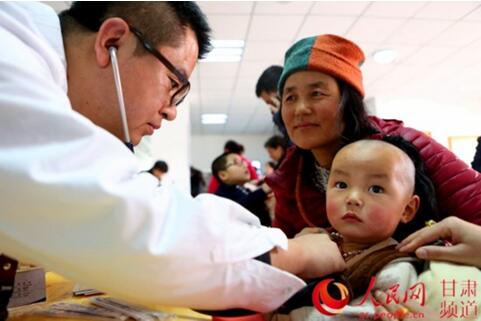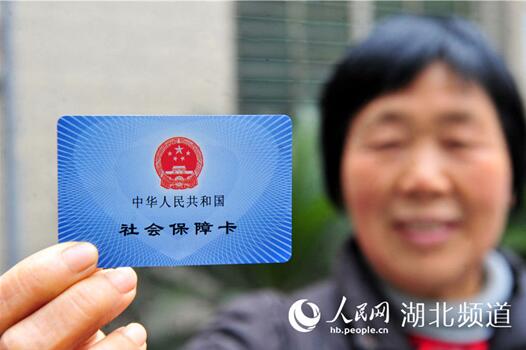


A doctor in China’s northwest Gansu province is treating local Tibetan public. (Photo by Yin Yan, Mou Jian from People’s Daily)
Corruption crackdown, social insurance, medical care reforms, employment and resident income, and equal access to education are among the hottest topics of the annual sessions of National People’s Congress (NPC) and Chinese People’s Political Consultative Conference (CPPC), also referred as the “two sessions,” a poll conducted by People’s Daily Online, Xinhua, and other mainstream news websites showed.
China's anti-corruption campaign shifted up a gear following the 18th CPC National Congress in late 2012. After years of efforts, the spread of corruption has been effectively contained and the battle against corruption has gained crushing momentum.
Data showed that since 2012, a total of 240 central-government administered officials have been investigated, with 223 receiving punishments, while another 150 were transferred to judicial authorities for investigations. During the past year, 57,000 party members took the initiative to confess their wrongdoing.

Yang Cuisheng, a resident from Yichang of Hubei province,demonstrates her social insurance card. (By People’s Daily Online)
China is now also reforming its supervision system, in an innovative attempt to realize an all-round supervision ofthe civil servants by pooling accessible resources.
China also stepped up its efforts to extend the coverage of social insurance. The country plans to, by 2020, provide comprehensive medical care across the country, improve public healthcare service system, and build a complete drug supply system as well as a scientific management system of medical care institutions.
The over 10 million new urban jobs created each year verified China’s remarkable accomplishments in employment. But challenges remain. The market has to digest 15 million new job hunters each year, while both the employers and job hunters face difficulties to find their matched partners. In addition, those having a job also expect more incomes for sake of a better life quality.
According to its national plan on education, China plans to, by 2020, accelerate urban-rural integration of compulsory education, ensure equal access to compulsory education at local schools for the children of migrant workers, and establish a balanced compulsory education system in county seats and villages.To realize the goals, the Chinese government has set objective tooptimize resource allocation and improve the quality of education products.

March 4, 2017, the web page of the poll made by People’s Daily Online on the hottest topics of the two sessions
 Fire brigade in Shanghai holds group wedding
Fire brigade in Shanghai holds group wedding Tourists enjoy ice sculptures in Datan Town, north China
Tourists enjoy ice sculptures in Datan Town, north China Sunset scenery of Dayan Pagoda in Xi'an
Sunset scenery of Dayan Pagoda in Xi'an Tourists have fun at scenic spot in Nanlong Town, NW China
Tourists have fun at scenic spot in Nanlong Town, NW China Harbin attracts tourists by making best use of ice in winter
Harbin attracts tourists by making best use of ice in winter In pics: FIS Alpine Ski Women's World Cup Slalom
In pics: FIS Alpine Ski Women's World Cup Slalom Black-necked cranes rest at reservoir in Lhunzhub County, Lhasa
Black-necked cranes rest at reservoir in Lhunzhub County, Lhasa China's FAST telescope will be available to foreign scientists in April
China's FAST telescope will be available to foreign scientists in April "She power" plays indispensable role in poverty alleviation
"She power" plays indispensable role in poverty alleviation Top 10 world news events of People's Daily in 2020
Top 10 world news events of People's Daily in 2020 Top 10 China news events of People's Daily in 2020
Top 10 China news events of People's Daily in 2020 Top 10 media buzzwords of 2020
Top 10 media buzzwords of 2020 Year-ender:10 major tourism stories of 2020
Year-ender:10 major tourism stories of 2020 No interference in Venezuelan issues
No interference in Venezuelan issues
 Biz prepares for trade spat
Biz prepares for trade spat
 Broadcasting Continent
Broadcasting Continent Australia wins Chinese CEOs as US loses
Australia wins Chinese CEOs as US loses